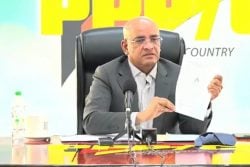Last Monday, President Obama signed The Lord’s Resistance Army Disarmament and Northern Uganda Reconstruction Act, landmark legislation which prepares the way for coordinated diplomatic, humanitarian and military initiatives to confront one of Africa’s most brutal insurgencies. The Lord’s Resistance Army (LRA) was formed twenty years ago out of a coalition of rebel groups set up to defend the Acholi people from President Museveni’s campaigns to remove his “enemies” in Northern Uganda. Since Joseph Kony, the founder and current LRA leader, assumed full control in the early 1990s, the group has engaged in extremely brutal military campaigns. These have included the abduction of at least 20,000 child soldiers, mass killings, rapes and mutilations.
Julien Mbia, the Catholic Bishop of Isiro-Niangara, welcomed the US decision to intervene in the crisis and commented that “The violence committed by the guerrillas is unspeakable. Unfortu-nately, so far the response from the Congolese army and UN peacekeepers of the UN Mission in Congo has been inadequate in facing up to this scale of violence.” The bishop’s polite despair is completely justified. Since massacring several hundred civilians in the Democratic Republic of Congo last December, the rebels have killed at least 96 more in northeast DRC, and carried out further atrocities in southern Sudan and Central Africa. In fact, earlier diplomatic initiatives may well have exhausted Kony’s interest in negotiation. The 2006 peace talks at Juba, Sudan were suspended indefinitely after he refused to sign an agreement that would have exposed him to prosecution for war crimes at the International Criminal Court in the Hague.
After signing the new legislation, a statement from President Obama noted that the LRA leadership “has no agenda and no purpose other than its own survival.” That may be true, but the group’s ability to survive previous existential threats is exactly what makes it such a formidable opponent. During the last five years the LRA has not only outmanoeuvred military campaigns by the DRC, Sudan and Uganda, and political overtures such as President Museveni’s “Peace, Recovery and Development Plan” in 2007, it has mastered the arts of guerrilla warfare.
In a recent article in the World Politics Review, Ledio Cakaj, a field researcher for the anti-genocide Enough project, points out that far from being the lunatic portrayed by the Ugandan media, Kony is “an adept and shrewd tactician.” His troops are well drilled, they use sophisticated field communications (dual-frequency radios and satellite phones) and can move much faster than the Ugandan units sent to track them. Furthermore, the notoriously corrupt Ugandan People’s Defence Force has dangerously overestimated its own capabilities. Although its troops outnumber the LRA on paper, an internal investigation “concluded that a large number of UPDF soldiers, many of them in LRA-affected areas, did not exist. These so-called ‘ghost soldiers’ had been created by UPDF commanders in order to pocket their salaries.”
Although international military cooperation has had some success in restraining the LRA, the group’s long experience, its well-honed tactics and its complete lack of humanitarian principles will continue to make it an intractable enemy for quite some time. That is why the US initiative emphasizes the need for simultaneous action on several fronts. Commenting on the new US legislation, John Norris, the Executive Director of the Enough Project acknowledges that “Peace talks could be an option for the future – contingent on changes to the current situation on the ground – but the best strategy to ending this deadly rebel group now is found in the [multilateral strategy in the] bill we have today.”
Why should anyone in Guyana or the Caribbean care about this? One answer is that our compassion for the extraordinary suffering which has been caused by the LRA should have nothing to do with our national origins. (Human Rights Watch estimates that in addition to thousands of dead civilians, conflict with the LRA has displaced nearly two million people.) The internal conflicts of Uganda, Sudan and the Congo may seem obscure to us, but our political squabbles are no less peripheral to the rest of the world. A more compelling argument may be that until widely distant countries learn to take greater interest in each other, the international community will always lack the political will necessary to intervene in crises like this. The horrors of recent conflicts in Rwanda, Bosnia, Sudan and the Congo could all have been lessened significantly if far-off countries had been more willing to get involved.
Nearly 50 years ago, in A Far Cry From Africa, a haunting poem on Kenya’s Mau Mau uprising, Derek Walcott warned against the danger of analyzing distant conflicts in abstract terms: “Statistics justify and scholars seize / The salients of colonial policy. / What is that to the white child hacked in bed? / To savages, expendable as Jews?” Torn between ancestral sympathies for the African natives, and his linguistic affiliation with the Englishmen they were fighting against, Walcott ends his meditation on the suffering of people he does not know with the memorable lines: “How can I face such slaughter and be cool? / How can I turn from Africa and live?” As the history of modern Africa continues to darken and disappoint its early promises, Walcott’s view of our shared humanity becomes all the more important. Groups like Rwanda’s interahamwe, Sudan’s janjaweed or Uganda’s LRA do not go quietly into the dustbin of history, they have to be placed there by decisive international action. The Obama administration, whatever its other shortcomings, deserves full credit for realizing this, and taking the first step towards making it a reality.





